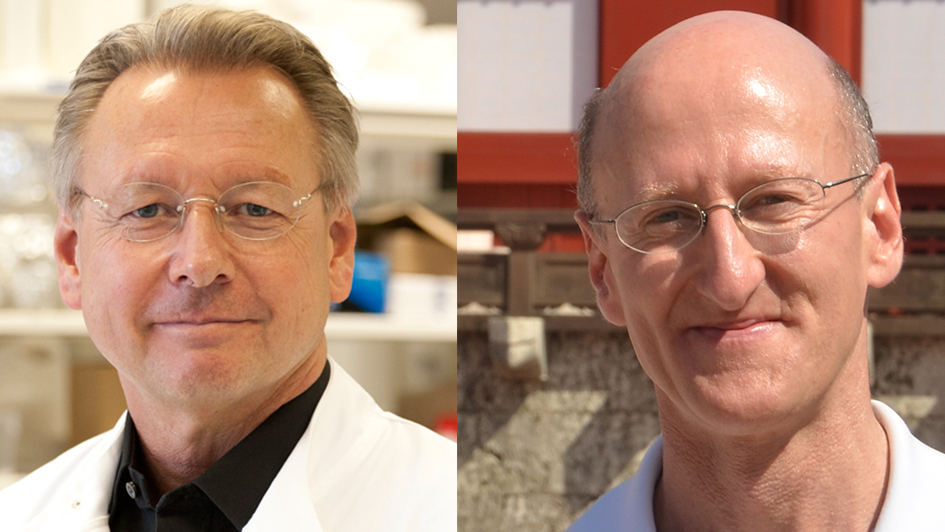
Professors Paul Workman (left) and Jon Pines will be formally admitted to the Royal Society in a ceremony at the organisation
Professor Paul Workman, Chief Executive of The Institute of Cancer Research, London, and Professor Jon Pines, Head of Cancer Biology, will be admitted as Fellows to the Royal Society on Friday 15 July 2016 — the greatest honour in UK science.
Professors Workman and Pines were elected for their outstanding contributions to cancer research and will attend the formal admission ceremony at the Royal Society in London this afternoon in front of family and friends.
The ceremony is the culmination of three days of events to introduce new Fellows to the Royal Society.
Election to Fellowship of the Royal Society — the UK’s national academy of science — is one of the highest accolades a researcher can receive and recognises individuals for their scientific excellence and substantial contributions to research endeavours.
Recognition for achievements
Each year, the Royal Society elects up to 52 new Fellows chosen from all sectors of science, technology and engineering across the UK and the Commonwealth. Illustrious previously elected Fellows include Sir Isaac Newton, Charles Darwin, Albert Einstein and Stephen Hawking.
Professor Workman was recognised for his achievements in discovering targeted cancer drugs and Professor Pines for his rigorous exploration of how cells regulate their growth and division.
Over the first two days of the events, the newly elected Fellows took part in the New Fellows Seminar, where they discussed their research in the presence of their peers and other members of the Royal Society.
On Wednesday 13 July 2016, Professor Pines gave a seminar about his research, titled ‘Regulating mitosis: sea urchins, jellyfish and the island of Serandip’. His team have developed a way to measure how living human cells break down proteins to ensure chromosomes are segregated equally during cell division.
On Thursday 14 July 2016, Professor Workman discussed ‘Discovering drugs and chemical probes for the cancer genome and the malignant state.’ He talked about the contributions he has made to the discovery of targeted drugs for precision treatment, including inhibitors of protein kinases, PI3 kinase and the molecular chaperone HSP90. He also discussed the challenges of drug resistance and new approaches to overcoming this.
'Deeply honoured'
The new Fellows will be formally admitted to the Society at the Admissions Day ceremony today.
During the ceremony they sign the Royal Society Charter Book, recording the signatures of each new fellow since 1663, and the Obligation of the Fellows of the Royal Society, where they promise to ‘promote the good of the Royal Society of London for Improving Natural Knowledge’.
Professor Workman said: “This is a wonderful recognition of the work of members of my lab team at the ICR, together with the contributions made by numerous colleagues and collaborators who have worked with me over my career. I’d also like to thank the facilities, corporate and admin staff whose contribution to science often goes unrecognised, and all those who have funded and supported the ICR and my own research. Most importantly, thanks to my wife and family for their invaluable support.
“I’m also very happy to see this recognition of the science of drug discovery, and the importance of multidisciplinary team science.”
Professor Pines said: “I am deeply honoured to be elected to the Royal Society. Reflecting on this, I am exceedingly grateful to my mentors who set me on my scientific path and continued to offer their critical but generous guidance, my colleagues who helped and encouraged me to strike out in new directions, and my team, whose achievements this honour recognises. It also highlights the vital contribution that fundamental science makes to cancer research.”
The ICR now has four Fellows of the Royal Society among current staff, with Professor Mel Greaves, Director of the Centre for Evolution and Cancer, and Professor Julian Downward, who has a joint post between the ICR and The Francis Crick Institute, being the others. In addition, Professor Peter Rigby, the ICR’s Professor Emeritus of Developmental Biology, is also a Fellow.